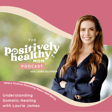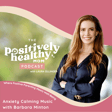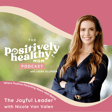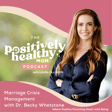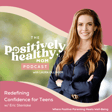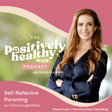Become a Creator today!Start creating today - Share your story with the world!
Start for free
00:00:00
00:00:01

How to Deal with Mom Guilt
In our twenty-sixth episode, "How to Deal with Mom Guilt," we're honored to host Linda Alexander, an Elite Neuroencoding Specialist, Master NLP Practitioner, and Master Coach in Timeline Therapy.
Originally from Germany and now based in the US, Linda is dedicated to empowering mothers to thrive amidst life's whirlwind. Recognizing the pervasive challenges of motherhood, Linda offers invaluable insights through her 'Time to Thrive Program,' a proven system designed to help mothers overcome obstacles, cultivate resilience, and achieve holistic success.
Join us for a compassionate discussion on navigating and overcoming the burdens of mom guilt. 🌸💖
Book Your Free Call
Positively Healthy Coaching
The Positively Healthy Mom Facebook Group
Transcript
Introduction to Positively Healthy Mom Podcast
00:00:00
Speaker
Hey moms, it's Laura Olinger.
00:00:02
Speaker
Welcome to the Positively Healthy Mom podcast.
00:00:05
Speaker
Because there's no manual for the hardest job in the world.
Guest Introduction: Mindset Coach Linda Alexander
00:00:09
Speaker
Welcome to part two of my conversation with Linda Alexander.
00:00:12
Speaker
She's a mindset coach for moms.
Struggling with Mom Guilt
00:00:15
Speaker
So, okay, switching gears.
00:00:17
Speaker
How do you help moms deal with mom guilt?
00:00:21
Speaker
That's probably like the biggest problem.
00:00:24
Speaker
I'm common universal emotion that we all have.
00:00:27
Speaker
And especially I know it's just so strong in the United States.
00:00:30
Speaker
I can't really speak to other countries, but it's like, oh, it just happens.
00:00:34
Speaker
Like, I'll tell you an example recently.
00:00:37
Speaker
I have I go to my kids.
00:00:38
Speaker
I have four kids.
00:00:39
Speaker
They all play sports.
00:00:40
Speaker
I go to all their games.
00:00:42
Speaker
I I really don't miss anything.
00:00:45
Speaker
Well, a few weekends ago, there was a basketball tournament and I had a ton of work to catch up on.
00:00:52
Speaker
So I'm like, you know what?
00:00:52
Speaker
I've been to everything of his.
00:00:54
Speaker
I literally haven't missed of anything.
00:00:56
Speaker
So I missed the one thing that turned out they won the tournament and they're all celebrating.
00:01:00
Speaker
And then all the parents are taking pictures, but it's all just the moms and the sons.
00:01:04
Speaker
So my son was the only one without a mom in the picture.
00:01:07
Speaker
And I was like, oh,
00:01:08
Speaker
Oh, the one time I chose to catch it all season.
00:01:11
Speaker
Like it wasn't all the games were no big deal.
00:01:13
Speaker
And like the one I chose to skip is the one that I felt awful about.
00:01:17
Speaker
So I really had to talk myself off kind of a cliff there and just be like, you know what?
00:01:22
Speaker
He knows I love him.
00:01:23
Speaker
He knows I care.
00:01:26
Speaker
He, you know, knows I've been to every other game.
00:01:27
Speaker
Like I'm not going to allow this one instance to like really destroy me because for a second it did.
00:01:33
Speaker
It did destroy me for a second, but I had to get myself out of that.
00:01:36
Speaker
So how do you work with moms on that?
Managing Guilt with Self-Compassion
00:01:39
Speaker
So the first thing that like, if you were telling me this as my client, I would ask you, well, what would you say to your best friend?
00:01:46
Speaker
If your best friend just told you the story and said like, hey, I felt so bad that I couldn't be there.
00:01:51
Speaker
And it was like this one time they won and all the other moms were there.
00:01:55
Speaker
I was literally the only one.
00:01:57
Speaker
What would you tell that friend?
00:01:59
Speaker
Because the truth is we are often the hardest on ourself.
00:02:04
Speaker
It's like this constant talk in our head.
00:02:07
Speaker
And that's like one thing we want to be actually be mindful of and start training our brain to think differently.
00:02:15
Speaker
Because we are going to get holiday long.
00:02:17
Speaker
It will be like, this is so bad.
00:02:19
Speaker
Like you should have been there.
00:02:20
Speaker
And now like the day is ruined.
00:02:22
Speaker
And so so that would be like my first question for you.
00:02:26
Speaker
And then also often we have so high expectations.
00:02:31
Speaker
Nobody else has the same expectations of us.
00:02:34
Speaker
So another question I would have is like, well, what was the experience for your son?
00:02:39
Speaker
Like, did he have fun?
00:02:40
Speaker
Did he enjoy the win?
00:02:42
Speaker
Did he come home and say like, oh my gosh, mom, we won.
00:02:45
Speaker
And it was so amazing.
00:02:47
Speaker
And we celebrate and we had such a great time.
00:02:49
Speaker
And then you can have that moment with him right there.
00:02:53
Speaker
Because in our head, we want this idea of I have to be there so he knows that I love him.
00:02:59
Speaker
Well, if he comes home to you and he's like excited to share it with you and he's like, you can celebrate right there and then.
00:03:08
Speaker
Well, did you really miss anything?
00:03:11
Speaker
Because at the end you feel guilty because you feel like it's bad for him.
00:03:17
Speaker
But what if it isn't?
00:03:18
Speaker
Right.
00:03:20
Speaker
But what if it isn't?
00:03:21
Speaker
Yeah, that's that that is so powerful.
00:03:24
Speaker
That's such a powerful message, because at the end of the day, he celebrated with his buddies and his coach.
00:03:29
Speaker
And, you know, we're like a village,
Impact of Parental Expectations on Children
00:03:31
Speaker
we're a tribe.
00:03:31
Speaker
And so all the moms, you know, we're all there.
00:03:34
Speaker
And he knows that he's known them all since he was five years old.
00:03:36
Speaker
He's now 14, almost 15.
00:03:37
Speaker
So, you know, he feels very comfortable with them.
00:03:40
Speaker
And, you know, at the end of the day, I'm not sure he I don't think it affected him at all.
00:03:45
Speaker
I think he I think he would have preferred me there, but I don't think it hurt him in any way.
00:03:50
Speaker
And then it's okay.
00:03:51
Speaker
I actually had like a similar experience when my son, I think it was his third birthday.
00:03:57
Speaker
We had like for the first time rented a place and it was like one of those indoor trampoline jumping places.
00:04:06
Speaker
And of course, like I was going crazy.
00:04:08
Speaker
Like I was like, oh my gosh, are people showing up?
00:04:11
Speaker
And is it going to be a big celebration?
00:04:12
Speaker
And he's three, right?
00:04:14
Speaker
So we were at that place and at the official starting time, there was
00:04:19
Speaker
two other kids with their parents out of like the 16 kids that we invited and for a moment I was freaking out I was like oh my gosh nightmare coming true like there's nobody here and then I looked over at him and
00:04:37
Speaker
And I just see him playing with these big blocks that they had lying around and building like this, this big house or whatever with his dad and the other kid, like one of the other kids was just with them.
00:04:49
Speaker
Another kid was just living his like own amazing life going down the slide by itself.
00:04:55
Speaker
And I realized nothing was bad in that moment.
00:04:58
Speaker
It was just me thinking that it was bad.
00:05:02
Speaker
Nobody else had the feeling like there was something missing.
00:05:05
Speaker
If anything, these kids had more space to just do whatever they wanted.
00:05:11
Speaker
So I just let go of it in that moment and I could enjoy it myself.
00:05:15
Speaker
And I could just say, you know what, this is perfect.
00:05:17
Speaker
We have way more than enough food because we plan for more people.
00:05:21
Speaker
So all good.
00:05:23
Speaker
And then also over time, more people joined us.
00:05:26
Speaker
So it was really like the start that had me got anxious where I was starting to go into my head.
00:05:32
Speaker
But once we step out and actually look at it from a different perspective, we often can see it's like, no, it's actually
Challenges of Gentle Parenting
00:05:40
Speaker
OK.
00:05:40
Speaker
It's good because we are doing more than we would expect from anyone else.
00:05:47
Speaker
Mm hmm.
00:05:48
Speaker
Yes.
00:05:48
Speaker
I love the idea of having moms, you know, ask themselves these questions about what does this mean to me and why?
00:05:57
Speaker
And so I recently made a video, you know, I make little reels for social media and I made one about disciplining your kids or what your expectations are of your kids.
00:06:08
Speaker
And, you know, I work mainly with teenagers and their parents.
00:06:11
Speaker
And so a lot of it is about academic performance, athletic performance, you know, the extracurriculars, getting ready for college, college entrance exams, all those things.
00:06:22
Speaker
And a lot of times parents are so what's the word?
00:06:27
Speaker
incredibly invested in a very loving way.
00:06:30
Speaker
But I when it gets to the point of, it's kind of like damaging the relationship a little bit.
00:06:36
Speaker
And there is kind of like putting a lot of pressure on it.
00:06:39
Speaker
I encourage people to say, well, why is this important?
00:06:42
Speaker
Just like step back for a minute and say, what is the meaning of this that my child does A, B, and C or X, Y, and Z?
00:06:49
Speaker
Because is it really about them?
00:06:51
Speaker
Is it my love for them?
00:06:53
Speaker
Or is it something that I'm trying to make up for in my past?
00:06:57
Speaker
Like I didn't feel good that I didn't get into good college.
00:06:59
Speaker
And so therefore I want this for my kid or I didn't feel good that I didn't make the soccer team.
00:07:04
Speaker
So I want my kid to write.
00:07:06
Speaker
It's like, Whoa, there has to be this boundary of like, what's about me?
00:07:10
Speaker
What's my stuff and what's their stuff.
00:07:14
Speaker
I actually love that you brought that up because I think that is where the key is in my opinion, because
00:07:22
Speaker
Often we think like we get mad because the kids are having the meltdown or they're fighting again, like with their sibling.
00:07:31
Speaker
And I just cannot like have a quiet place, whatever it is.
00:07:35
Speaker
But often it's something that is actually from the past that is brought up within us.
00:07:41
Speaker
So, and I think that's why it's so important to actually work through emotions that are piled up in our past, because that's where we can make the biggest difference by really letting go of our own things.
00:07:55
Speaker
Because then I can actually show up as the mom that I want to be because I don't carry my own things anymore.
00:08:02
Speaker
Instead, I can be actually supportive.
00:08:04
Speaker
Yeah.
00:08:05
Speaker
Versus if I don't work through my own emotions, then I'm going to try to be the gentle parent.
00:08:12
Speaker
And I'm going to be like, I listen to you and share what's going on.
00:08:15
Speaker
And I try this for a couple minutes.
00:08:17
Speaker
And then I realize, oh, my gosh, I'm getting really agitated.
00:08:20
Speaker
And I'm really getting nervous and anxious.
00:08:22
Speaker
And it's not working.
00:08:23
Speaker
And it's supposed to work.
00:08:24
Speaker
And I'm failing
Emotional Intelligence in Parenting
00:08:25
Speaker
here.
00:08:25
Speaker
And all these emotions pile up until I burst.
00:08:30
Speaker
Yeah.
00:08:31
Speaker
Maybe it's screaming.
00:08:32
Speaker
Maybe it's like throwing like a door or like hitting the tables and enough is enough.
00:08:37
Speaker
And there goes the channel parenting.
00:08:39
Speaker
Now, I don't think it's like,
00:08:42
Speaker
it's a surprise because nobody teaches us how to deal with our emotions.
00:08:47
Speaker
And I think that's why the work we do is so important because I had high expectations of myself.
00:08:54
Speaker
I said like, I'm going to be this amazing mom and I give my, my child so much room.
00:08:59
Speaker
And then I realized like all these things happened.
00:09:01
Speaker
Yeah.
00:09:02
Speaker
Like that the emotions piled up and I was like, tried my best and it just failed and failed and failed and failed until I realized, wait a minute, it's, it's, it's not this little kid.
00:09:13
Speaker
It's actually in me and I need to work through it.
00:09:16
Speaker
But then nobody took the time to tell me how to deal with my emotions.
00:09:21
Speaker
We just, we just expected to be able to teach it now to our kids without having it learned ourselves.
00:09:28
Speaker
Yeah.
00:09:29
Speaker
Yeah.
00:09:30
Speaker
No.
00:09:31
Speaker
Oh, I'm so glad you said that.
00:09:32
Speaker
That is like the, one of the biggest things that I've noticed and kind of educated myself on is just the importance of the parent having that emotional intelligence and the emotional regulation involved.
00:09:45
Speaker
so that they can pass it to their child.
00:09:48
Speaker
Because, you know, you know, you work with moms with younger kids.
00:09:52
Speaker
And so there's a lot of it's funny, because our clientele is probably similar, just different ages, where there's some meltdowns, and there's some emotions, and there's some yelling and some screaming and some big stuff.
00:10:02
Speaker
And that's just like what happens with teenagers.
00:10:05
Speaker
But it's like, they don't know their little bodies don't know what to do with the anger or the jealousy or the frustration, right.
00:10:14
Speaker
And so it's like,
00:10:15
Speaker
we can sit, you know, if we can learn that ourselves, then we can be there to sit with them so that they can, we can help them work through it.
00:10:23
Speaker
Right.
00:10:24
Speaker
Yes, absolutely.
Growth Through Trial and Error for Children
00:10:26
Speaker
Absolutely.
00:10:26
Speaker
And I think it, like you said, it starts with asking the right questions, asking for a different perspective and then really doing the deeper work and letting go of emotions and finding ways to regulate ourselves.
00:10:40
Speaker
It's just had another thought that, that kind of, um,
00:10:46
Speaker
Maybe we'll come back later.
00:10:49
Speaker
Well, good timing for a little pause on that.
00:10:51
Speaker
And, you know, if you, but we got a comment that said, give some kids some space.
00:10:57
Speaker
I completely agree with that.
00:10:58
Speaker
What do you, what do you feel about that?
00:11:00
Speaker
Yeah, absolutely.
00:11:01
Speaker
Absolutely.
00:11:02
Speaker
I think, I think it comes back to that.
00:11:04
Speaker
We have our own expectation and our own like,
00:11:09
Speaker
Like the guilt comes in and like the ideal of I want it perfect that sometimes we want it so much that we don't give room for the kids to just do it their way because...
00:11:23
Speaker
life comments.
00:11:25
Speaker
Oh yes, this is life.
00:11:26
Speaker
I love that.
00:11:27
Speaker
I love that.
00:11:30
Speaker
For whoever said that, thank you so much.
00:11:34
Speaker
Giving, um, the kids some space and some room to, to be themselves.
00:11:39
Speaker
And, and that's one thing that, you know, has actually come up in, in my life recently, which is, um,
00:11:48
Speaker
you know, to allow your kid to be them with their own unique personalities.
00:11:52
Speaker
You know, since I have four, I see the four different personalities.
00:11:55
Speaker
And so it's like, what's good for one isn't good for another.
00:11:58
Speaker
And so they, they, it's a constant, just like balancing act in my head of, you know, cause mine are, my youngest is 11.
00:12:06
Speaker
My oldest is almost 16.
00:12:08
Speaker
And so it's like how much to be,
00:12:12
Speaker
with them and how much to kind of just let them go and figure it out and, you know, trial and error and let them make mistakes.
00:12:19
Speaker
And, you know, it's, it's, I personally, I, I use a lot of my just intuitive feeling about it.
00:12:25
Speaker
I kind of like that, you know, nonverbal cues from them when I'm seeing like, Oh, they're getting annoyed with me.
00:12:31
Speaker
Okay, fine.
00:12:31
Speaker
I'll leave.
00:12:32
Speaker
Yeah.
00:12:34
Speaker
I go in and I check in on the boys.
00:12:36
Speaker
My boys share a bedroom and I'm like, hey, guys, you know, what's what's going on?
00:12:39
Speaker
Like, what's what's up for tonight?
00:12:40
Speaker
Do you have any homework or what's your plan for this weekend?
00:12:43
Speaker
You know, whatever the conversation I kind of just start out with.
00:12:46
Speaker
And and they some and I can tell sometimes they want to talk.
00:12:49
Speaker
Sometimes they don't.
00:12:50
Speaker
So when they don't, I'm not going to force it.
00:12:52
Speaker
I'm just like, OK, have fun.
00:12:53
Speaker
Let me know if you need anything.
00:12:54
Speaker
I'm here.
00:12:54
Speaker
I'll be right out here in the kitchen or whatever.
00:12:56
Speaker
You know what I mean?
00:12:57
Speaker
Yeah, absolutely.
00:12:58
Speaker
And I think that's what it's about.
00:12:59
Speaker
It's like this dance, right?
00:13:01
Speaker
Sometimes we have more, sometimes we have less.
00:13:04
Speaker
Do we always know which one it is?
00:13:06
Speaker
No, we find out as we go.
00:13:08
Speaker
Actually, for me, when I was a kid,
00:13:12
Speaker
And I watched my parents.
00:13:14
Speaker
I always thought like my parents are the ones with the answer.
00:13:17
Speaker
Like they seem to have life figured out.
00:13:19
Speaker
They planned the events ahead and they had like everything structured and were always like, well, and like three steps ahead versus I was still at breakfast.
00:13:29
Speaker
They had already planned out the whole weekend.
00:13:31
Speaker
Like, you know, like things were like I was sitting there as a kid thinking like, how do they do that?
00:13:37
Speaker
And I just thought, oh my gosh, they just have life figured out.
00:13:41
Speaker
So when I was getting older, I was waiting for this moment where I would figure life out.
00:13:47
Speaker
And I got older and I was 20 and I was like, surely enough.
00:13:50
Speaker
And I get 20 like this must be the moment.
00:13:52
Speaker
And I still felt like, no, no, I'm still learning.
00:13:55
Speaker
I'm still falling down.
00:13:56
Speaker
I'm still not sure what I'm doing here.
00:13:58
Speaker
And I got older and still the same thing until finally hit me.
00:14:04
Speaker
they didn't have it figured out.
00:14:06
Speaker
It was just over the years that it seemed that way because they did exactly that dance, that dance of finding out where do I let go?
00:14:13
Speaker
Where do I do this?
00:14:15
Speaker
How do I approach this?
00:14:16
Speaker
And it's,
00:14:18
Speaker
And I think that's what it's about.
00:14:20
Speaker
It's a journey.
00:14:21
Speaker
So enjoy the journey and really let go of the expectation and something beautiful may come out of it because none of us have it figured out.
00:14:31
Speaker
Yeah.
00:14:32
Speaker
And that's okay.
00:14:33
Speaker
Right.
00:14:34
Speaker
And kind of being, you know, just from an energetic sense, just being present and allowing things to, you know, come and go, but we're not going to micromanage.
00:14:43
Speaker
We're not going to be anxious, you know, because anxiety is about, you know, the future and, you know, depression tends to be more about the past, but we're not going to go to either of those.
00:14:53
Speaker
We're just going to be where we are and allow things
Self-Improvement and Coaching for Parents
00:14:56
Speaker
to happen.
00:14:56
Speaker
So I
00:14:57
Speaker
Moving on to our next topic, I know we talked a little bit about the timeline therapy, but what tools do you feel like have had the biggest impact on you?
00:15:06
Speaker
Can you go into that a little bit deeper?
00:15:11
Speaker
Actually, I think for me, tool-wise, it's really NLP, really letting go, working with the unconscious, timeline therapy, really letting go of emotions.
00:15:22
Speaker
But I actually was recently asked by someone that was like pretty much like, hey, can you,
00:15:28
Speaker
does it stop after that?
00:15:29
Speaker
Does it stop?
00:15:31
Speaker
And my answer is no, it's a constant journey.
00:15:34
Speaker
It's a constant journey of letting go because the truth is we experience things each and every day.
00:15:40
Speaker
So even if I let go of things, everything until last week, well, this week still happens.
00:15:46
Speaker
And I still find myself getting upset or being confused.
00:15:51
Speaker
And they're just other things coming up.
00:15:53
Speaker
So
00:15:54
Speaker
So for me, it's a little bit like an onion and you just start peeling like the layers.
00:15:59
Speaker
And you probably experience the same thing with your clients.
00:16:02
Speaker
Like as you go deeper, there's just more to uncover because we just go to a different level.
00:16:08
Speaker
So definitely for me, the most powerful tool is that and then just asking the right question and getting a different perspective.
00:16:17
Speaker
I always say there's a reason why I as a coach have a coach, because, yes, I can help other people, but I cannot help myself the same way.
00:16:26
Speaker
And why is that?
00:16:28
Speaker
Because I'm too close.
00:16:29
Speaker
I'm too emotionally involved.
00:16:32
Speaker
It's kind of like I'm right in front of the forest.
00:16:35
Speaker
I have these big trees in front of me.
00:16:37
Speaker
And I cannot see the forest because of that.
00:16:40
Speaker
And I will literally stand there like, what do you mean?
00:16:42
Speaker
What do you mean?
00:16:42
Speaker
So I need someone that helps me point these things out.
00:16:47
Speaker
And I think that's what it's about.
00:16:48
Speaker
Often we think.
00:16:50
Speaker
We need to do it alone because we need to be strong and independent and we need to do it by ourselves.
00:16:56
Speaker
When this is the hard way, there's an easier way by having a coach, having a Laura or Linda or someone else to guide you, to help you uncover actually the big tree in the forest that you don't see.
00:17:08
Speaker
Mm hmm.
00:17:10
Speaker
Yeah.
00:17:11
Speaker
You know, we all have blind spots, whether we want to admit it or not.
00:17:16
Speaker
And so something that just popped into my head, you know, because my question kind of generally was, you know, what is your best advice for moms?
00:17:25
Speaker
And maybe you have an answer to that.
00:17:26
Speaker
But what I really took away from what you just said is.
00:17:31
Speaker
Ask the right questions and get a coach.
00:17:35
Speaker
We're not trying to make a commercial for ourselves here.
00:17:38
Speaker
But at the end of the day, what I'm thinking is, you know, a mom could be fully like on board, like, oh, my gosh, I could use that.
00:17:45
Speaker
I could get some I would love some support or some help or some guidance or someone who could help me find my blind spots.
Benefits of Coaching on Family Relationships
00:17:52
Speaker
What is your way of, you know, if a mom really wants to work with you, but a lot of times the husband has to kind of get on board or, you know, agree to that.
00:18:01
Speaker
How would you ask that mother to, you know, frame coaching to their husband or their co-parent?
00:18:11
Speaker
That is a great question.
00:18:14
Speaker
I almost want to say I didn't have that, that.
00:18:19
Speaker
that scenario that much so far.
00:18:23
Speaker
I'm trying to think of my own experience.
00:18:26
Speaker
For me, it was an open conversation with my husband because
00:18:30
Speaker
Because I went through the same thing where I said like, hey, I really want to work on myself.
00:18:35
Speaker
I want to let go of some things.
00:18:37
Speaker
I feel like this is the right path.
00:18:38
Speaker
It means I need to spend some money and I need to spend some time, which is not easy because it pretty much means that he needs to do the work and he needs to be there for our son.
00:18:48
Speaker
And we talked open about it, what it means and made sure that we're both on board.
00:18:53
Speaker
Yes.
00:18:54
Speaker
But I think the important, in my perspective, the importance there is to have an open communication.
00:19:01
Speaker
And just say how it is, because at the end, the family will benefit from it.
00:19:06
Speaker
It's not it's not something for just you.
00:19:08
Speaker
Even if you do it for you, it's not for you because it's going to have this ripple effect.
00:19:14
Speaker
It's going to impact your family.
00:19:16
Speaker
It's going to impact your your dynamic.
00:19:20
Speaker
to the good.
00:19:21
Speaker
So it's actually something that you do for the whole family.
00:19:25
Speaker
Yeah, that was going to be my answer.
00:19:27
Speaker
If you would flip me around and ask me that question, which is, I have a new client who has some mother, daughter, teenage daughter conflict, lots of conflict.
00:19:37
Speaker
And, you know, it's funny how the conflict just kind of infiltrates the whole family because there's another sibling, there's the dad.
00:19:45
Speaker
And so it's like, if I'm working with the mom and the mom is seeking me out to get some coaching, that's really going to benefit the entire family and not just...
00:19:53
Speaker
the one daughter with the conflict, but the younger daughter who someday may, you know, come into that position as well as having conflict.
00:20:00
Speaker
It, you know, we help with communication skills.
00:20:02
Speaker
We help with our emotional regulation.
00:20:03
Speaker
So really is a benefit for the whole family.
00:20:05
Speaker
And I, I hope that's something that maybe moms can realize today that they hadn't thought of before.
Prioritizing Self-Care for Moms
00:20:10
Speaker
So we are getting out of time.
00:20:12
Speaker
So I want to make sure we have covered everything.
00:20:15
Speaker
Okay.
00:20:15
Speaker
So why don't we do that?
00:20:16
Speaker
What would be, you know, if you do have just a few more tips for moms and say this is the only thing they ever hear from you, what would those be?
00:20:24
Speaker
Hmm.
00:20:27
Speaker
I think for me, it comes back to what we talked about at the beginning.
00:20:32
Speaker
Put yourself first because you're worth it and you deserve it.
00:20:35
Speaker
I think that is one of the biggest
Finding Positive Meaning in Mundane Tasks
00:20:39
Speaker
things.
00:20:39
Speaker
And then also, you're not the anger.
00:20:42
Speaker
You're not the hurt.
00:20:44
Speaker
You're not the emotion.
00:20:45
Speaker
Because sometimes we label ourselves as like a... About like being a...
00:20:52
Speaker
specific person like oh I always get so angry or I'm always getting so impatient no that's just how you show up and if that's something you want to work through and change you absolutely can because it's just something that just a layer if that makes sense it's just a layer and it's not who you are being mom is cool absolutely
00:21:19
Speaker
Enjoy the ride, right?
00:21:21
Speaker
Yes.
00:21:21
Speaker
All these comments are coming today.
00:21:23
Speaker
Yeah.
00:21:23
Speaker
And so kind of my answer, because I always like to ask myself the same question I'm asking my guests is, you know, if there was just like a, if I only had two minutes with somebody and this is like all I was ever going to get with them,
00:21:35
Speaker
It would be kind of what we talked about before, which is changing the meaning.
00:21:39
Speaker
So a lot of and it kind of goes hand in hand with putting yourself first.
00:21:43
Speaker
So, you know, a lot of what we do as moms is not glamorous.
00:21:47
Speaker
It's not, you know, fun.
00:21:50
Speaker
There's a lot of things we just have to do as part of the job, you know, whether that be, you know, making appointments or driving or cleaning or cooking or right all those things.
00:21:59
Speaker
That's not the fun stuff.
00:22:00
Speaker
The fun stuff is interacting with your child, right, or having special memories created or whatever.
00:22:06
Speaker
And so if we can get over somehow these things that we don't love, and I'm not saying you have to love doing the dishes, but if you can reframe it in your mind, I had another guest on, you know, Marcus, I think, you know, Marcus Weiss.
00:22:20
Speaker
We had a whole topic about how, what that means, because if I just did the dishes, that means, um,
00:22:27
Speaker
You know, I just created this awesome meal and I just fed my kids something really healthy that they loved and they enjoyed.
00:22:32
Speaker
And we got to sit down as a family and have connection time.
00:22:35
Speaker
And the dishes are just a small byproduct of that.
00:22:37
Speaker
But I'm not going to hyper focus on like, oh, great.
00:22:39
Speaker
Now we have to do the dishes.
00:22:41
Speaker
You know, it's just me like, yeah, I got to do the dishes because we had just had this great meal.
00:22:45
Speaker
And what that means and maybe even even if you can't shift the meaning, but you can shift the focus.
00:22:49
Speaker
So the focus became on the quality time with the family.
00:22:52
Speaker
and less on what it took to either prior or after to deal with that.
00:22:57
Speaker
What is your thought about that?
00:22:59
Speaker
I absolutely agree with you.
00:23:01
Speaker
And I also understand that this may be hard for some people to understand now I'm supposed to be excited for doing the dishes.
00:23:09
Speaker
something that helped me actually fairly recently with that is so for me, sometimes it was hard to motivate myself at the end of the day, you know, like it was one of those long days going to work, taking care of the little guy, pretty much getting up at 5am in the morning and the day ends like at nine.
00:23:25
Speaker
And that's just like when all the extra stuff is supposed to start.
00:23:30
Speaker
And I had a hard time like making myself, for example, do the dishes.
00:23:34
Speaker
And what I heard there was like, well,
00:23:38
Speaker
Tomorrow, like tomorrow when I wake up, I do not deserve tired Linda.
00:23:44
Speaker
I don't deserve to deal with what tired Linda didn't do.
00:23:48
Speaker
And I thought that was such a beautiful way to reframe that as well.
00:23:52
Speaker
And it's just like a different way of looking at it.
00:23:55
Speaker
to say you know what I take care of this right now so that relaxed me or like me in an hour doesn't have to deal with it because I'm taking care of it right there and then and I think it shows just beautifully what this whole conversation was about like there's always so many different perspectives and while it's for someone maybe like I'm getting excited to do the dishes because it means I I
00:24:19
Speaker
I have made a beautiful dinner and had a good time with my family for someone else.
00:24:24
Speaker
It means just like, hey, you know what?
00:24:25
Speaker
I do this now for me.
00:24:27
Speaker
So I don't have to deal with it later because I want to make sure that I take care of myself.
00:24:33
Speaker
And that's just another way of taking care of myself.
00:24:35
Speaker
So there's always so many different perspectives.
00:24:38
Speaker
And at the end, it's about understanding what works for you.
00:24:42
Speaker
Because what motivates you and guides you is completely different from what motivates me and guides me.
00:24:49
Speaker
So we just need to find the same, like the right thing for each one.
Avoiding Procrastination for a Better Future
00:24:53
Speaker
And it will be much more easier and much more at flow.
00:24:58
Speaker
Mm hmm.
00:24:59
Speaker
Yes.
00:25:00
Speaker
OK, we're almost out of time, but I can't let that one point go, which is, you know, I recently heard something about procrastination and that when you procrastinate, the idea is that you're being unkind to your future self.
00:25:13
Speaker
And so if you can think of yourself as a friend, like you did earlier with that self-compassion conversation we had.
00:25:20
Speaker
Be kind to your future self.
00:25:21
Speaker
Don't give yourself a big pile of dirty dishes in 5 a.m.
00:25:25
Speaker
in the morning.
00:25:26
Speaker
You know, for me, I like to get my kitchen clean at night.
00:25:28
Speaker
So that way when I have morning, it's all clean and ready to go.
00:25:30
Speaker
It might be different for other people.
00:25:32
Speaker
But the idea is don't give yourself a big job in the future.
00:25:35
Speaker
It's like handing a future self a big boulder.
00:25:37
Speaker
Your future self doesn't want the big boulder.
00:25:39
Speaker
Just deal with it now.
00:25:40
Speaker
And that might help you get kind of motivated to do the next thing.
00:25:43
Speaker
Take that action that needs to be taken.
00:25:45
Speaker
And so you can feel better.
00:25:46
Speaker
And, you know, at the end of the day, celebrate.
00:25:48
Speaker
We're all doing awesome as
Connecting with Linda Alexander
00:25:49
Speaker
moms.
00:25:49
Speaker
We're all doing the best we can.
00:25:51
Speaker
And we're awesome.
00:25:51
Speaker
And we're amazing.
00:25:52
Speaker
We're fabulous.
00:25:53
Speaker
So with that, Linda, how can people find you after today?
00:25:58
Speaker
So I have two spaces because I don't do all the social medias.
00:26:02
Speaker
So one is on Facebook, either under my name, Linda Alexander, or my Facebook group.
00:26:08
Speaker
It's a free Facebook group, Thriving Mom Village, where moms come together.
00:26:13
Speaker
They want to grow with each other.
00:26:15
Speaker
I share weekly tips, tricks, and tools.
00:26:18
Speaker
what to do to shift the mindset and just have like a supporting environment because we cannot do it alone.
00:26:26
Speaker
It literally takes a village.
00:26:28
Speaker
And the other place is my website, which is www.thethrivingmomlife.com.
Podcast Conclusion and Call to Action
00:26:35
Speaker
Those are the two places.
00:26:37
Speaker
Okay.
00:26:37
Speaker
Say that website one more time just so people can hear it.
00:26:41
Speaker
www.thethrivingmomlife.com.
00:26:45
Speaker
Okay.
00:26:46
Speaker
That's awesome.
00:26:46
Speaker
Well, Linda, thank you so much for the time today.
00:26:49
Speaker
I really appreciate it.
00:26:50
Speaker
There were so many great tidbits throughout.
00:26:52
Speaker
Was there one highlight that you had?
00:26:55
Speaker
I think I actually really liked like the whole conversation.
00:26:59
Speaker
I love how it all tied into the reframing for me.
00:27:03
Speaker
A big thing when it comes to procrastination is it's just a prettier version of perfection and perfection is just something we will never achieve.
00:27:13
Speaker
So just let go of it.
00:27:15
Speaker
I really enjoyed it.
00:27:16
Speaker
I would love to go deeper and yeah.
00:27:18
Speaker
Thank you so much for, for having me.
00:27:20
Speaker
Okay.
00:27:21
Speaker
Fantastic.
00:27:21
Speaker
All right.
00:27:22
Speaker
Thank you for listening to the Positively Healthy Mom podcast because there's no manual for the hardest job in the world.
00:27:29
Speaker
Don't forget to subscribe and share with your friends.

